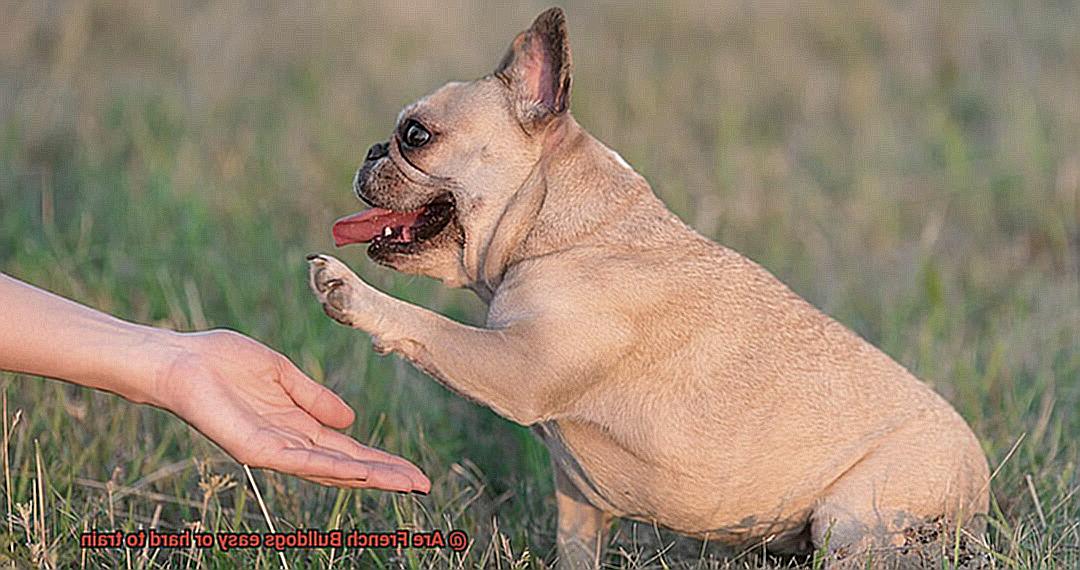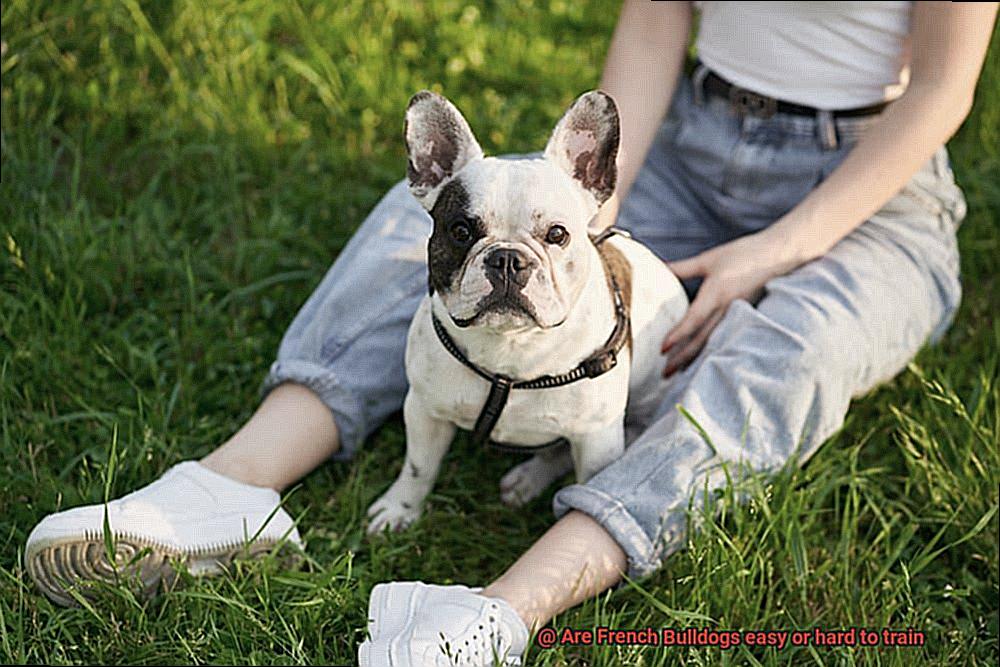Are French Bulldogs easy or hard to train?
Hey there, dog lovers.
Contents
- 1 Understanding the Stubborn Nature of French Bulldogs
- 2 The Benefits of Training a French Bulldog from an Early Age
- 3 Effective Training Techniques for French Bulldogs
- 4 Positive Reinforcement Strategies for French Bulldogs
- 5 Keeping Training Sessions Short and Fun for French Bulldogs
- 6 Avoiding Harsh Training Methods with French Bulldogs
- 7 Crate Training for Housebreaking and Safety
- 8 Socialization and Its Role in Training a French Bulldog
- 9 Conclusion
Today, we’re diving into the world of French Bulldogs and their training journey. Frenchies, those wrinkly-faced cuties, have become quite popular lately.
With their charming personalities and adorable looks, it’s no wonder they’ve stolen hearts left and right. But when it comes to training, are French Bulldogs a breeze or a bit more of a challenge?
Let’s explore the ins and outs of training these lovable pups and see just how much effort it takes to turn them into well-behaved companions.
Understanding the Stubborn Nature of French Bulldogs
French Bulldogs are undeniably adorable with their smooshed faces and bat-like ears, but they also possess a stubborn streak that can sometimes make training a bit challenging. If you own a French Bulldog, you may have experienced their independent and headstrong nature firsthand.
In this article, we will delve into why French Bulldogs are known for their stubbornness and explore effective strategies to overcome this trait during training.
Independent streak:
French Bulldogs have a strong independent streak, which means they are not as eager to please their owners compared to some other dog breeds. This independence can manifest itself during training sessions when they may refuse to follow commands or become easily distracted by their surroundings.

Intelligence and manipulation:
French Bulldogs are known for their intelligence, which can be both a blessing and a challenge in training. These dogs are quick learners and may sometimes use their intelligence to manipulate situations to their advantage. They may test boundaries or try to find loopholes in the training process.
Sensitive temperament:
French Bulldogs have a sensitive temperament and are highly attuned to their owner’s emotions. If they sense frustration or impatience during training sessions, they may become even more stubborn or resistant. It is important to approach training with patience and a calm demeanor.
Physicality:
French Bulldogs have a stocky build and a low center of gravity, which can make them resistant to physical manipulation or coercion. They may be less inclined to comply with certain commands if they feel physically uncomfortable or restrained.
Tips for Training French Bulldogs:
- Start early: Begin training your French Bulldog from an early age to establish good behavior and obedience habits.
- Consistency is key: Be consistent in your training methods and routines to avoid confusion. French Bulldogs respond well to repetition and clear expectations.
- Positive reinforcement: Use treats, praise, and rewards to motivate your French Bulldog during training sessions. They are food-motivated, so using treats as a training reward can be highly effective.
- Short and engaging sessions: Keep training sessions short and engaging to maintain your French Bulldog’s interest and focus. They have a relatively short attention span, so breaking up training into smaller sessions can be more effective.
- Gentle approach: Avoid harsh training methods or punishment as French Bulldogs can be sensitive. Harsh methods can lead to fear or anxiety, which can hinder the training process.
- Crate training: Consider crate training your French Bulldog to help with housebreaking and provide them with a safe space of their own.
- Socialization is key: Expose your French Bulldog to various people, animals, and environments from a young age to prevent behavioral issues like aggression or anxiety.

The Benefits of Training a French Bulldog from an Early Age
French Bulldogs are known for their adorable appearance and affectionate nature. They are intelligent and eager to please, which makes them generally easy to train. However, starting their training from an early age can provide several benefits for both the dog and the owner.
Establishing a Strong Bond
Training sessions provide an opportunity for the dog to learn to trust and respect its owner, while also allowing the owner to understand the needs and behaviors of their dog better. This bond is crucial for effective communication and a harmonious relationship between the two.
Shaping Behavior
Early training helps in shaping the French Bulldog’s behavior and prevents the development of unwanted habits or aggression issues. By starting the training process early on, owners can teach their French Bulldogs basic commands such as sit, stay, and come, as well as proper leash walking and housebreaking. Consistent training from an early age establishes a foundation of good behavior that can prevent future behavioral problems.
Socialization
Early training helps socialize French Bulldogs with other dogs, people, and various environments. Exposing them to different situations and experiences at a young age helps them become more confident and adaptable in different settings. This socialization plays a crucial role in preventing fearfulness or aggression towards strangers or unfamiliar situations later in life.
Mental Stimulation
Training a French Bulldog from an early age aids in mental stimulation. These dogs thrive on mental challenges, and providing them with regular training exercises keeps their minds engaged and prevents boredom. Mental stimulation through training can also help prevent destructive behaviors that may arise when a dog is not mentally stimulated enough.
Lifelong Learning
Early training sets a positive precedent for lifelong learning. By introducing basic obedience commands and teaching proper behavior from a young age, owners lay the groundwork for continued training throughout their French Bulldog’s life. This enables them to participate in more advanced training activities such as agility, obedience competitions, or even therapy work if desired.
Effective Training Techniques for French Bulldogs
Training a French Bulldog can be a rewarding experience, but it requires effective techniques tailored to their unique characteristics. In this comprehensive guide, we will explore the importance of positive reinforcement, consistency, short training sessions, clear commands, socialization, patience, and seeking professional help when training your French Bulldog.
Positive Reinforcement:
French Bulldogs respond best to positive reinforcement, which involves rewarding good behavior with treats, praise, or playtime. This technique motivates them to repeat desired behaviors in the future.
Consistency is Key:
Establishing consistent rules and expectations is crucial for training French Bulldogs. They thrive on routine and predictability, so using the same commands and gestures consistently helps them understand what is expected of them.
Short Training Sessions:
French Bulldogs have shorter attention spans compared to other breeds. To prevent boredom and frustration, opt for multiple short training sessions throughout the day rather than one long session.
Clear Commands:
French Bulldogs respond best to concise and simple commands. Stick to one-word commands like “sit,” “stay,” or “come” to avoid confusion. Use clear hand gestures to reinforce your commands.
Socialization:
Exposing your French Bulldog to various people, animals, and environments from a young age is essential for their development. Puppy classes, playdates with other dogs, and gradual exposure to different environments help them develop good social skills.
Patience and Positive Attitude:
French Bulldogs are sensitive dogs, so patience and a positive attitude are key when training them. Avoid harsh or punitive methods as they can hinder progress. Stay patient and use positive reinforcement to encourage desired behaviors.
Seeking Professional Help:
If you encounter difficulties in training your French Bulldog or need guidance on specific behavior issues, don’t hesitate to consult a professional dog trainer or behaviorist. They can provide expert advice tailored to your dog’s individual needs.
Positive Reinforcement Strategies for French Bulldogs
Training a French Bulldog can be a rewarding experience for both you and your furry friend. However, it is important to approach training with the right strategies to ensure success. In this blog post, we will explore the importance of positive reinforcement when training French Bulldogs and provide practical tips to help you on your training journey.
The Power of Positive Reinforcement:
Positive reinforcement involves rewarding desired behaviors to encourage their repetition. This method has been proven to be highly effective in training French Bulldogs. By using rewards such as treats, praise, toys, or any other form of positive reinforcement that motivates your individual dog, you can create a positive association with desired behaviors.
Motivating Rewards:
Finding what motivates your French Bulldog is key to successful training. Each dog is unique, so it may take some trial and error to discover what reward works best for your furry friend. Experiment with different treats, toys, or activities to find what gets their tail wagging with excitement.
Consistency is Key:
French Bulldogs thrive on routine and consistency. Establishing clear expectations and consistently rewarding desired behaviors will help your dog understand what is expected of them. Stick to a regular training schedule and be consistent in your commands and rewards.
Timing is Everything:
Timing is crucial when using positive reinforcement. Rewards should be given immediately after the desired behavior occurs to reinforce the connection between the behavior and the reward. This helps your French Bulldog understand what they are being rewarded for.
Verbal Cues:
Using clear and consistent verbal cues is essential in positive reinforcement training. Teach your French Bulldog simple commands like “sit,” “stay,” or “come” and pair them with rewards. This will reinforce their understanding and encourage them to repeat the desired behaviors.
Short and Engaging Sessions:
French Bulldogs have shorter attention spans compared to other breeds. Keep training sessions short, around 10-15 minutes, to keep them focused and motivated. Incorporate fun activities or games to make the training sessions engaging and enjoyable for your furry friend.
Patience and Positivity:
French Bulldogs are sensitive dogs, and harsh or negative training methods can be counterproductive. Stay patient and positive throughout the training process. Focus on rewarding and reinforcing the behaviors you want to see more of, while ignoring or redirecting unwanted behaviors. This positive approach will create a stronger bond between you and your French Bulldog.
Keeping Training Sessions Short and Fun for French Bulldogs
Training sessions are an essential part of raising a well-behaved and obedient French Bulldog. However, these sessions can be challenging due to the breed’s stubborn nature and short attention span. To ensure effective training, it is crucial to keep the sessions short and fun. Here are some tips to help you achieve this:
- Short and Sweet: French Bulldogs have a limited attention span, so keep each training session brief, around 10-15 minutes. Breaking the training into smaller steps will make it easier for your furry friend to understand and retain the information.
- Positive Reinforcement: French Bulldogs respond best to positive reinforcement techniques. Use treats, praise, or a clicker to reward your dog when they successfully complete a command. This will motivate them and make the training sessions enjoyable.
- Playful Approach: Incorporate play into your training sessions. French Bulldogs love interactive toys, so use them as rewards or as a way to engage your dog during the training process. This will keep their interest levels high and make the sessions more enjoyable for both of you.
- Distraction-Free Environment: Choose a quiet and distraction-free area for training. French Bulldogs can easily get sidetracked by noises or other people or animals around them. Creating a calm environment will help them focus on the training tasks at hand.
- Be Patient and Consistent: French Bulldogs may take longer to learn commands compared to other breeds. Stay patient and consistent with your training efforts, and remember that every small step forward is a success. Avoid using harsh or punitive methods as this can lead to fear or aggression in your dog.
- Bonding Experience: Training should be a bonding experience between you and your French Bulldog. Keep the atmosphere light-hearted and enjoyable by using casual language, incorporating playfulness into your commands, and using positive reinforcement techniques.
Remember, consistency is key when training your French Bulldog. Repeat the sessions regularly, and be persistent in your efforts. With time, patience, and a positive approach, your French Bulldog will become a well-trained and obedient companion.
Avoiding Harsh Training Methods with French Bulldogs
French Bulldogs are beloved companions known for their sensitive and affectionate nature. When it comes to their training, it is important to avoid harsh methods that can cause anxiety, fear, and even aggression in these gentle dogs. In this article, we will explore why avoiding harsh training methods is crucial for French Bulldogs and provide tips on how to train them effectively using positive reinforcement techniques.
Why Avoid Harsh Training Methods?
- Sensitivity: French Bulldogs have a sensitive temperament, and harsh methods can easily break their trust and damage their emotional well-being.
- Fear and Anxiety: Harsh training techniques like yelling or physical punishment can create fear and anxiety in French Bulldogs, leading to behavioral issues.
- Aggression: When subjected to harsh methods, French Bulldogs may become defensive or aggressive as a self-protective response.
Tips for Gentle Training:
- Positive Reinforcement: Use treats, praise, and playtime to reward good behavior and encourage your French Bulldog to repeat desired actions.
- Consistency: Establish clear rules and boundaries from the start to provide structure and routine, which French Bulldogs thrive on.
- Short and Engaging Sessions: Keep training sessions brief (5-10 minutes) but frequent throughout the day to maintain your dog’s attention and prevent boredom.
- Patience and Understanding: French Bulldogs may take longer to learn certain commands or behaviors, so be patient and avoid frustration or resorting to harsh methods.
- Professional Guidance: Seek help from a certified dog trainer who specializes in positive reinforcement techniques for tailored guidance in training your French Bulldog effectively.
Creating a Positive Environment:
- Regular Exercise: Provide daily walks or play sessions to keep your French Bulldog physically active and mentally stimulated.
- Interactive Toys: Offer stimulating toys or puzzles to challenge your dog’s mind and prevent boredom.
- Socialization Opportunities: Expose your French Bulldog to different people, animals, and environments to enhance their social skills and confidence.
Crate Training for Housebreaking and Safety
Crate training is a valuable tool for establishing a routine, teaching bladder and bowel control, and ensuring the safety of your furry companion. In this blog post, we will explore the benefits of crate training, how to introduce your French Bulldog to the crate, and important guidelines to follow. Let’s dive in.
Benefits of Crate Training:
- Housebreaking: Crates provide a designated space for your French Bulldog, helping them develop bladder and bowel control. Dogs naturally avoid soiling their sleeping area, so the crate encourages them to hold their urge until they are taken outside.
- Safety and Security: As curious puppies, French Bulldogs may get into mischief or encounter potentially dangerous situations when left unsupervised. Crating them when you can’t be around ensures their safety and prevents destructive behavior.
Introducing Your French Bulldog to the Crate:
- Make it Positive: Create a positive association with the crate by placing treats or toys inside to entice your French Bulldog to enter. Feeding them meals in the crate also helps them view it as an enjoyable space.
- Gradual Progression: Start with short periods in the crate, gradually increasing the duration. Praise and reward good behavior to reinforce positive associations with the crate.
Important Guidelines for Crate Training:
- Never Use as Punishment: The crate should be seen as a safe and comfortable space, never as a form of punishment. Avoid forcing your French Bulldog into the crate or leaving them inside for extended periods without breaks.
- Proper Sizing: Ensure the crate is appropriately sized for your French Bulldog. It should be large enough for them to stand, turn around, and lie down comfortably but not too spacious that it encourages soiling.
- Routine and Consistency: Establish a consistent routine for crate usage, including regular potty breaks and exercise. Consistency is key to successful crate training.
Socialization and Its Role in Training a French Bulldog
Today, we’re diving into the world of socialization and its pivotal role in training your adorable Frenchie. Just like humans, dogs need socialization to thrive and become well-rounded individuals. So, let’s unleash the social butterfly within your French Bulldog.
Why Socialization Matters:
Socialization is the key to raising a confident and friendly French Bulldog. Without proper exposure to different people, animals, and environments, your Frenchie may develop behavioral issues like aggression or fearfulness. By socializing them from a young age, you’ll help them navigate the world with ease and grace.
The Socialization Blueprint:
- Start early: Begin socializing your French Bulldog between 3 and 14 weeks old. This critical period is when they’re most receptive to new experiences.
- Variety is the spice of life: Expose your Frenchie to a smorgasbord of stimuli – sights, sounds, smells, and textures. Take them on walks in different environments, introduce them to new friends (both human and furry), and let them explore various objects.
- Positive reinforcement: Reward good behavior during socialization with treats, praise, and play. This helps your Frenchie associate positive experiences with meeting new people or animals.
- Gradual exposure: Avoid overwhelming your Frenchie by introducing new experiences gradually. Slowly increase the level of difficulty as they become more comfortable.
- Consistency is key: Make socialization a regular part of your Frenchie’s routine. Practice makes perfect.
Supercharge Your Efforts:
Consider enrolling your Frenchie in puppy classes or obedience training. These controlled environments provide supervised interactions with other dogs and professional guidance.
Maintaining Their Social Skills:
Socialization should continue throughout your Frenchie’s life, albeit less intensively as they grow older. Regular outings, playdates, and positive interactions with people will keep their social skills sharp.
Remember, be patient and understanding during the socialization process. Each Frenchie is unique, so tailor your approach to their individual needs. With time and effort, you’ll raise a French Bulldog that’s ready to take on the world with a wagging tail and a heart full of joy.
Em5WE9QFfa0″ >
Conclusion
In conclusion, training French Bulldogs can be a bit of a challenge. While they are intelligent and eager to please, their stubborn nature and independent streak can make training sessions more difficult than with other breeds. However, with patience, consistency, and positive reinforcement techniques, it is definitely possible to train a French Bulldog successfully.
It’s important to remember that each dog is unique and may have different learning styles and personalities. Some French Bulldogs may be more responsive to certain training methods than others. Therefore, it’s essential to adapt your approach and find what works best for your furry friend.
One key aspect of training French Bulldogs is establishing yourself as the leader in a firm yet gentle manner. These dogs thrive on clear boundaries and consistent rules. By being confident and assertive without being harsh or aggressive, you can earn their respect and cooperation.
Another important factor in successful French Bulldog training is keeping the sessions short and engaging. These dogs have short attention spans, so breaking up the training into smaller sessions throughout the day can help maintain their focus. Using interactive toys or treats as rewards can also make the process more enjoyable for both you and your Frenchie.
Positive reinforcement techniques such as praise, treats, or playtime are highly effective with French Bulldogs. They respond well to rewards and will be motivated to repeat behaviors that result in positive outcomes. Avoid using punishment-based methods as these can damage the trust between you and your dog.
Consistency is key when it comes to training any dog, including French Bulldogs. Establishing a routine and sticking to it will help them understand what is expected of them. Regular practice of commands and behaviors will reinforce their understanding and improve their obedience over time.
In summary, while French Bulldogs may present some challenges during training due to their stubbornness, they are certainly trainable with the right approach. Patience, consistency, positive reinforcement, and establishing yourself as a confident leader are all keys to success when teaching your Frenchie new skills and behaviors.




